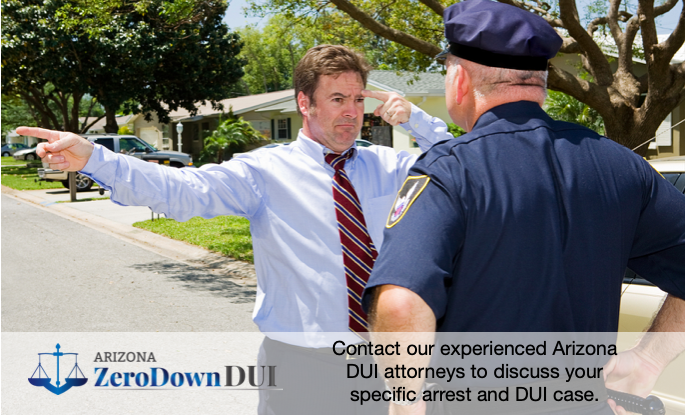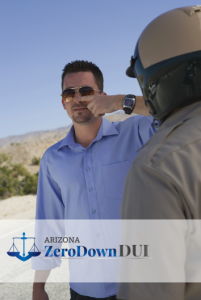Saying No to a Field Sobriety Test
 It’s no secret that Arizona has some of the strictest DUI laws. You can be charged with a DUI for driving with a blood alcohol content (BAC) as low as .04 percent. Before testing your BAC, the police officer will likely conduct field sobriety tests to assess your level of intoxication. When deciding whether or not you should submit to field sobriety testing, you need to understand what a field sobriety test actually is as opposed to a chemical test, why you may want to refuse, and what could happen if you do.
It’s no secret that Arizona has some of the strictest DUI laws. You can be charged with a DUI for driving with a blood alcohol content (BAC) as low as .04 percent. Before testing your BAC, the police officer will likely conduct field sobriety tests to assess your level of intoxication. When deciding whether or not you should submit to field sobriety testing, you need to understand what a field sobriety test actually is as opposed to a chemical test, why you may want to refuse, and what could happen if you do.
Field Sobriety Test vs. Chemical Testing
If an officer pulls you over under suspicion of drunk driving, the officer will likely ask you to submit to field sobriety testing. The three most common types of field sobriety tests are standing on one leg, walking in a straight line, and the horizontal gaze nystagmus. The horizontal gaze nystagmus (HGN) is a test where the officer will have you follow a light with your eyes and watch for signs of intoxication. Clearly, the officer’s discretion will have a huge role in determining your sobriety in all of these tests. You can, however, refuse a field sobriety test without risking losing your driver’s license.
Field sobriety tests are separate from breathalyzer, blood, and urine tests. If you have a driver’s license, you have given implied consent to these types of tests to prove your sobriety while on the road. Even if you don’t end up being convicted of criminal DUI charges, your driver’s license can be suspended for one year if you refuse to take these tests. You will need to attend a hearing at the MVD, usually within 10 days of your arrest, to prevent your one year license suspension.
Conditions That Can Affect the Accuracy of Field Sobriety Testing
There are a number of factors that could affect the police officer’s ability to assess your sobriety, and your ability to perform despite not being impaired, in field sobriety testing.
You may want to consider refusing a field sobriety test if any of these are present. These include:
- Inclement weather conditions
- The driver’s advanced age or weight
- The driver’s pre-existing medical conditions
- The condition of the road where the field sobriety test is conducted
- How the officer evaluated the field sobriety test
- Traffic and noise in the area
- If English is the driver’s first language, or the driver has any other difficulties communicating with the officer
How to Refuse to Take a Field Sobriety Test
 In Arizona, if you are pulled over for suspicion of driving under the influence, you are only required to provide the police officer with your name, driver’s license, insurance information, and vehicle registration. You may refuse to answer any other questions without your attorney present. However, being rude and refusing to comply with basic questions may arouse suspicion. When the officer asks you to take a field sobriety test, you should politely say no. If you have a disability or injury that would make completing the field sobriety test impossible even while sober, you should inform the officer.
In Arizona, if you are pulled over for suspicion of driving under the influence, you are only required to provide the police officer with your name, driver’s license, insurance information, and vehicle registration. You may refuse to answer any other questions without your attorney present. However, being rude and refusing to comply with basic questions may arouse suspicion. When the officer asks you to take a field sobriety test, you should politely say no. If you have a disability or injury that would make completing the field sobriety test impossible even while sober, you should inform the officer.
What May Happen After You Refuse a Field Sobriety Test
The officer may choose at that point to place you under arrest. At that time, you should not refuse any chemical testing as your driver’s license will be suspended for one year. The officer may simply take you into custody and get a warrant to test your blood or urine for alcohol.
If you are arrested after refusing a field sobriety test, you should talk to a DUI attorney as soon as possible. The prosecution may use your refusal to take a field sobriety test as evidence of your intoxication. If you end up going to trial, you need a good criminal defense attorney to rebut that argument. Your attorney may also argue defenses about whether the officer had probable cause to pull you over and place you under arrest.
If you’ve been arrested for DUI in Arizona, you are facing serious consequences in all aspects of your life. You should consult with experienced DUI attorneys to decide whether you want to proceed self-represented, with a public defender, or a private attorney in the matter. Call today to schedule your free consultation and see if we’re the right fit for you.

